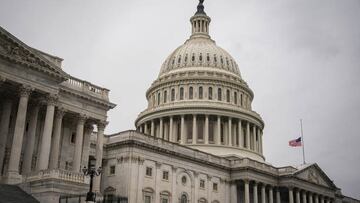How could the debt ceiling situation affect the unemployment rate?
Data has been published with the estimated economic damage if the US government cannot overcome its self-imposed debt ceiling issue.


The upcoming debt ceiling debate, and its consequences, are being fiercely debated. While it is more than likely that an accomodation will be found, the US has never defaulted on its debt obligations, the longer negotiations take the more damage is done to the economy.
Economic analysts are already looking at the permutations leading up to default day in mid June.
What could the damage be?
Mark Zandi, chief economist for Moody’s Analytics, estimated that the US would lose 6 million jobs, $12 trillion in household wealth and 4% of gross domestic product. The unemployment rate would double to 7%, putting an extra 2.8 million people out of a job.
“The US economy could suffer an economic hit comparable to the 2007-08 financial crisis and recession if the federal government defaulted on its debt,” The Hill’s Sylvan Lane wrote in analysing Moody’s report.
Why in the world does Congress have to authorize borrowing for spending that it has already approved?
— Robert Reich (@RBReich) January 19, 2023
Here’s a suggestion...
Abolish the debt ceiling.
It serves absolutely no purpose. End the drama. pic.twitter.com/PqI2Y45ao1
Pushing beyond the limit would stop all planned spending, including benefits and Social Security payments. The limit itself is self-imposed with Congress passing the legislation in 1939 and 1941. The only other country in the world with a limit measured in an absolute amount instead of a GDP percentage is Denmark.
Has the debt ceiling ever lead to a government default?
The US has never defaulted on its debt responsibilities, though it did come close during the Obama administration. The 2011 debt ceiling crisis outlined what can happen if the US government is caught in long negotiations, even if a full default is avoided. Worryingly, 2011 shared a number of key factors with the situation on Capitol Hill today.
House Republicans, who controlled the legislative arm, eventually agreed to approve a raising of the debt ceiling in exchange for a raft of future spending cuts. By this point borrowing costs had increased by nearly $19 billion as financial markets baulked at the uncertainty of events.
One of the big reasons why the debt ceiling crisis is different is because of the huge changes to the House Rules that are designed to prevent a deal unless it is on the terms of the hard-liners in the House. It seems most people don't realize how different it is this time.
— Daniel Schuman | @danielschuman@mastodon.social (@danielschuman) January 26, 2023
Related stories
“You are going to spent just as much fighting as you are to solve the damn thing,” said Bell, a former senatorial aide.
With both parties divided at current levels there is the chance of another drawn out confrontation. Congress has altered the debt limit 78 times since 1960.

